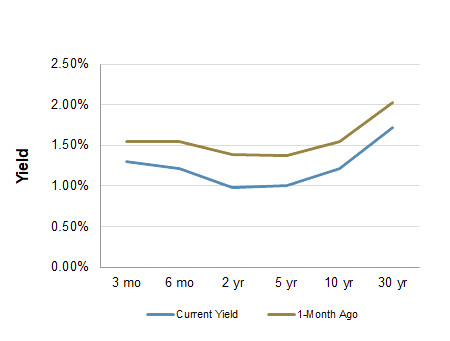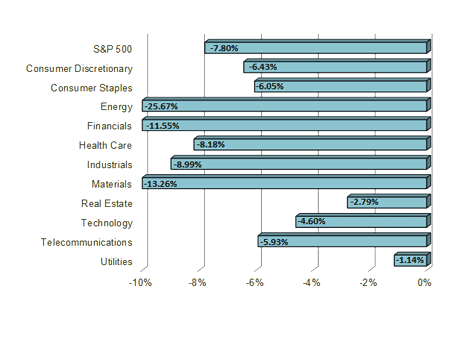Weekly Market Snapshot
Chief Economist Scott Brown discusses the latest market data.
The good news is that the spread of COVID-19 in China appears to have slowed. The very bad news is that the coronavirus has shown up in more countries. A wider expanse in the U.S., what health experts call “community spread,” threatens to sharply reduce economic activity here. No one knows for sure what the extent will be, but Nancy Messonnier, M.D., director of the National Center for Immunization and Respiratory Diseases, said that “it’s not so much a question of if this will happen anymore but rather more a question of exactly when this will happen and how many people in this country will have severe illness.” The major stock market indices fell sharply. Bond yields dropped to record lows.
Real GDP rose at a 2.1% annual rate in the second estimate for 4Q19 (same as in the advance estimate), with slight downward revisions to consumer spending and business fixed investment, but an upward revision to residential fixed investment. January personal spending figures were slightly disappointing, but income data remained consistent with solid consumer fundamentals. Durable goods orders suggested a possible bottoming in business investment (prior to COVID-19). The Chicago Business Barometer report noted that the coronavirus had an impact on supply chains, delaying supplier deliveries. The UM Consumer Sentiment Index remained high, but the report noted increasing mentions of COVID-19 ahead of the CDC warning.
Next week, with fears of COVID-19 dominating, investors are unlikely to place much emphasis on the economic data. However, look for possible comments about the coronavirus in the ISM surveys and in the Fed’s Beige Book. On Friday, the February Employment Report is likely to reflect moderate strength, possibly helped by unseasonably warm weather (pulling forward hiring that would otherwise have occurred in March or April) – census hiring will be a factor in the next few months, so focus on private-sector payrolls.
Indices
| Last | Last Week | YTD return % | |
|---|---|---|---|
| DJIA | 25766.64 | 29219.98 | -9.71% |
| NASDAQ | 8566.48 | 9750.97 | -4.53% |
| S&P 500 | 2978.76 | 3373.23 | -7.80% |
| MSCI EAFE | 1867.64 | 2003.68 | -8.31% |
| Russell 2000 | 1497.87 | 1696.07 | -10.22% |
Consumer Money Rates
| Last | 1 year ago | |
|---|---|---|
| Prime Rate | 4.75 | 5.50 |
| Fed Funds | 1.75 | 2.40 |
| 30-year mortgage | 3.29 | 4.53 |
Currencies
| Last | 1 year ago | |
|---|---|---|
| Dollars per British Pound | 1.289 | 1.326 |
| Dollars per Euro | 1.100 | 1.137 |
| Japanese Yen per Dollar | 109.59 | 111.39 |
| Canadian Dollars per Dollar | 1.339 | 1.317 |
| Mexican Peso per Dollar | 19.499 | 19.281 |
Commodities
| Last | 1 year ago | |
|---|---|---|
| Crude Oil | 47.09 | 57.22 |
| Gold | 1642.50 | 1316.10 |
Bond Rates
| Last | 1 month ago | |
|---|---|---|
| 2-year treasury | .98 | 1.38 |
| 10-year treasury | 1.21 | 1.55 |
| 10-year municipal (TEY) | 1.52 | 1.83 |
Treasury Yield Curve – 02/28/2020

As of close of business 02/27/2019
S&P Sector Performance (YTD) – 02/28/2020

As of close of business 02/27/2020
Economic Calendar
| March 2 | — | ISM Manufacturing Index (February) |
| March 6 | — | Employment Report (February) |
| March 18 | — | FOMC Policy Decision |
| April 29 | — | FOMC Policy Decision |
All expressions of opinion reflect the judgment of the Research Department of Raymond James & Associates, Inc. and are subject to change. There is no assurance any of the forecasts mentioned will occur or that any trends mentioned will continue in the future. Investing involves risks including the possible loss of capital. Past performance is not a guarantee of future results. International investing is subject to additional risks such as currency fluctuations, different financial accounting standards by country, and possible political and economic risks, which may be greater in emerging markets. While interest on municipal bonds is generally exempt from federal income tax, it may be subject to the federal alternative minimum tax, and state or local taxes. In addition, certain municipal bonds (such as Build America Bonds) are issued without a federal tax exemption, which subjects the related interest income to federal income tax. Municipal bonds may be subject to capital gains taxes if sold or redeemed at a profit. Taxable Equivalent Yield (TEY) assumes a 35% tax rate.
The Dow Jones Industrial Average is an unmanaged index of 30 widely held stocks. The NASDAQ Composite Index is an unmanaged index of all common stocks listed on the NASDAQ National Stock Market. The S&P 500 is an unmanaged index of 500 widely held stocks. The MSCI EAFE (Europe, Australia, Far East) index is an unmanaged index that is generally considered representative of the international stock market. The Russell 2000 index is an unmanaged index of small cap securities which generally involve greater risks. An investment cannot be made directly in these indexes. The performance noted does not include fees or charges, which would reduce an investor’s returns. U.S. government bonds and treasury bills are guaranteed by the US government and, if held to maturity, offer a fixed rate of return and guaranteed principal value. U.S. government bonds are issued and guaranteed as to the timely payment of principal and interest by the federal government. Treasury bills are certificates reflecting short-term (less than one year) obligations of the U.S. government.
Commodities trading is generally considered speculative because of the significant potential for investment loss. Markets for commodities are likely to be volatile and there may be sharp price fluctuations even during periods when prices overall are rising. Specific sector investing can be subject to different and greater risks than more diversified investments. Gross Domestic Product (GDP) is the annual total market value of all final goods and services produced domestically by the U.S. The federal funds rate (“Fed Funds”) is the interest rate at which banks and credit unions lend reserve balances to other depository institutions overnight. The prime rate is the underlying index for most credit cards, home equity loans and lines of credit, auto loans, and personal loans. Material prepared by Raymond James for use by financial advisors. Data source: Bloomberg, as of close of business February 27, 2020.

